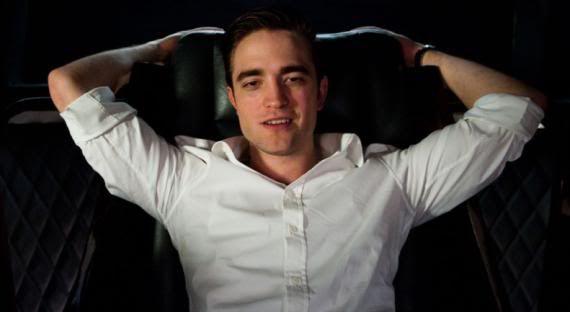Thursday, 14 June 2012
Interiors: "Cosmopolis"
That David Cronenberg has collaborated with hunk du jour Robert Pattinson on an adaptation of a Don DeLillo novel - in the process exposing a whole new teen demographic to one of world cinema's most distinctive auteurs, and one of America's foremost novelists - should have been cause to cheer. The disappointment with Cosmopolis is that Cronenberg has used the occasion to turn in a companion of sorts to last year's talky chamber piece A Dangerous Method. Both films unfold in locations that serve as extensions of their troubled protagonists' heads; Cronenberg has merely swapped the sanatoriums and drawing rooms of the past for a state-of-the-art stretch limousine cruising through the New York of a not-too-distant future. In the back of this vehicle, surrounded by almost unbelievably shoddy, credibility-shredding back- and side-projection, we find a investment banker (Pattinson) embarking on what will prove the longest (and possibly last) day of his young life. With the market plunging, and rumours of assassination attempts on power players giving way to reports of the real thing, our protagonist takes a series of meetings, attempts to prise a fresco or two off the walls of the Rothko chapel with his own vast personal fortune, ruts one mistress after another, submits to a prostate examination, and slowly - very slowly, as the limo edges through gridlocked traffic - becomes aware he may be being driven around the bend.
It is, in short, one of those episodic plots that may just function better on the page, where it can be put down and picked up; as a film, however, Cosmopolis plays like an absurd slo-mo of one of those chase scenes where characters pursue one another through one door of a car and out of the other. These are actors coming in to do audition pieces for a Great Director, and everybody passing through immediately begins declaiming as though they're very much in a David Cronenberg film of a Don DeLillo book. "Life is too contemporary," laments Juliette Binoche, shortly after hopping off our hero's lap. "You do, actually, reek of sexual discharge," the kid's icy blonde girlfriend (Sarah Gadon) tells him. Who says this stuff? Samantha Morton hops aboard as some sort of branding guru - part of the film's problem is a nagging vagueness about the very world it wishes to condemn - and Cronenberg may just as well have filmed her reading three consecutive pages from the novel for all the spontaneity she's allowed to bring to the role. Mathieu Amalric scatters some of his usual mischief in dispatches, but is stuck with windy speechifying in the role of a pie-flinging anti-capitalist who'd be trampled and hauled off before real-world security guards would allow a single word to pass from his bloodied lips.
The biggest casualty of all this waffle is suspense. There's so little progression, so little sense of a ramping-up, within this already dysfunctional world that the assassination threat gets muffled, and falls away; Cronenberg has to send on Paul Giamatti for the final half-hour, to talk us up to the frankly flatulent non-ending. In retrospect, A Dangerous Method's saving graces weren't directorial, but the interesting choices Messrs. Knightley, Fassbender and Mortensen made within the material presented to them. Here, Cronenberg has reverted to the vampiric performance mode he imposed upon his players in Crash, encouraging his principals to speak these words without feeling - the better, perhaps, the summon up the spirit of a world where money exists without meaning. Yet it's a blanket imposition that permits precious little variation, and results in almost impossibly stiff and uninvolving drama.
Hunting ready-made vampires made it inevitable that D-Cro and R-Pattz would cross paths, but putting the Twilight star front and centre submits him to a level of scrutiny he isn't, as yet, ready for: Pattinson makes for a very contemporary kind of void, but he isn't an especially compelling one to peer into for long, cursed as he is with the particular sallowness of the modern leading man: the inability to suggest experience beyond the pre-existing credits on his CV. It's fortuitous that Pattinson has something of George Osborne in his well-bred features, but he convinces as neither the kind of maths whizz who's made money enough to be shuttled around in a limo the entire day, nor as the the Patrick Bateman-esque sociopath (or fantasist) the character's excesses clearly intend him to be read as. Where Knightley, another erstwhile teen pin-up, ventured something dynamic with her jaw in the director's previous film, Pattinson's remains resolutely slack.
Cosmopolis retains a chilly elegance: back projection aside, Cronenberg's usual top-level production values, which have come to feel increasingly like a denial of the director's background in cheaper, scuzzier, yet more impactful horror pictures, are set firmly in place. But it's an igloo on wheels: gleaming yet hollow, inhospitable to anything so trifling as recognisable human life, or any greater notions about our society. (It gets particularly insincere - and, worse, terribly white and fogeyish - in the episode involving a slain, Tupac-like rapper that has nothing to do with anything, except to show how fundamentally out-of-touch this story's authors are.) Bad enough that the markets should have gone south, without this rush of told-you-so Cassandras picking over the carcass: but, hell, even the Will Ferrell vehicle The Other Guys was sharper on the relationship between capital and the lives it now routinely buys and sells. (And that was funny with it.) The adult me emerged, underwhelmed, after almost two hours of this; more damaging to the film's wider appeal, my inner Bella Swan was observed skulking towards the exit a good 90 minutes before.
Cosmopolis opens in cinemas nationwide tomorrow.
Subscribe to:
Post Comments (Atom)

No comments:
Post a Comment